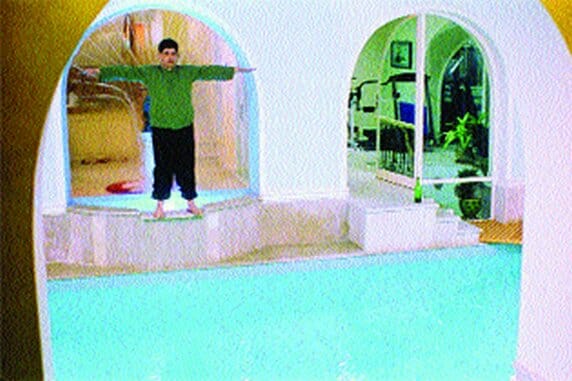
Iranian director Jafar Panahi burst onto the world cinema scene in the mid-’90s with The White Balloon. What appeared to be a simplistic tale about a young girl trying to buy a goldfish for New Year’s was revealed to be much more—a moving meditation on a changing Iran, driven home by an extraordinary freeze-frame ending. His next two features, The Mirror and The Circle, both garnered critical acclaim but couldn’t match the subtlety of his debut. Crimson Gold, which won major prizes at both the Cannes and Chicago film festivals, is a move in the right direction but is still tripped up by Panahi’s occasionally clumsy direction.
The movie opens with a spectacular, long, static shot, which features the end of a store robbery gone bad. Because the camera doesn’t move, it’s sometimes hard to tell what’s going on (a nice effect), and we’re forced to rely on the evocative, ambient soundtrack. The scene ends with the apparent suicide of one of the robbers, a heavy-set man known as Hussein.
The rest of the movie is a flashback, revealing who Hussein is and how he came to rob a jewelry store. Hussein turns out to be a compelling figure: courteous, about to be married, and working as a pizza deliveryman. His deliveries take him to some of Tehran’s richer neighborhoods. Indeed, this is one of the first Iranian films to reach the west that reveals the wealthier side of the country. Hussein’s interactions with the rich are sometimes friendly, sometimes rude, but always awkward, and the contrast between their opulence and his lack of opportunity is striking.
Indeed, maybe a bit too striking. Panahi and screenwriter Abbas Kiarostami are so intent on driving home the contrast that they drag out each scene a good two or three minutes longer than necessary. An early confrontation in the jewelry store is powerful at first but undermined by the sheer length of the scene. And a final sequence in a condo high above Iran dissipates its powerful message in a long coda.
Nonetheless, Crimson Gold is filled with tremendous acting, especially from Hussein Emadeddin as Hussein, and Panahi’s visual style continues to develop. The Iranian New Wave’s penchant for portraying ordinary but compelling characters struggling through their daily lives is a welcome contrast to Hollywood’s fixation on the stylish and famous.